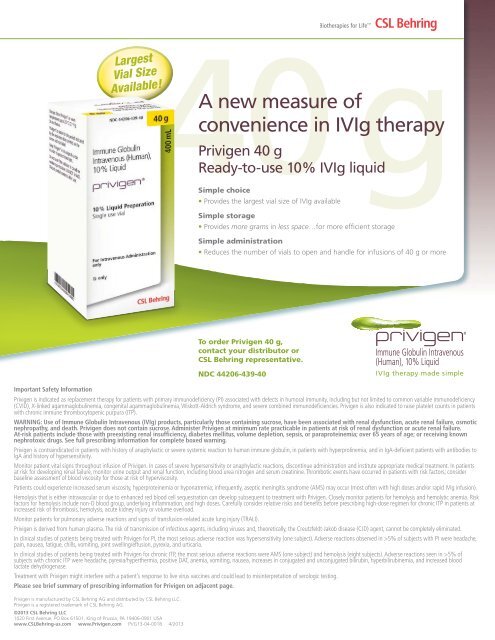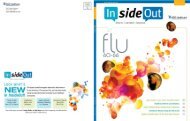Privigen ®Immune Globulin Intravenous (Human),10% LiquidInitial U.S. Approval: 2007BRIEF SUMMARY OF PRESCRIBING INFORMATIONThese highlights do not include all the information needed to use Privigensafely and effectively. See full prescribing information for Privigen.WARNING: ACUTE RENAL DYSFUNCTION/FAILURESee full prescribing information for complete boxed warning.• Renal dysfunction, acute renal failure, osmotic nephropathy, and deathmay occur with the administration of human immune globulin intravenous(IGIV) products.• Renal dysfunction and acute renal failure occur more commonly in patientsreceiving IGIV products that contain sucrose. Privigen does not containsucrose.• For patients at risk of renal dysfunction or renal failure, administerPrivigen at the minimum infusion rate practicable.------------------------------------INDICATIONS AND USAGE----------------------------------Privigen is an Immune Globulin Intravenous (Human), 10% Liquid indicated for thetreatment of:• Primary humoral immunodefi ciency (PI)• Chronic immune thrombocytopenic purpura (ITP)-------------------------------DOSAGE AND ADMINISTRATION-----------------------------Intravenous Use OnlyIndication Dose Initial InfusionRateMaintenance InfusionRate (if tolerated)PIITP200-800 mg/kg(2-8 mL/kg)every 3-4 weeks1 g/kg (10 mL/kg) for2 consecutive days0.5 mg/kg/min(0.005 mL/kg/min)0.5 mg/kg/min(0.005 mL/kg/min)Increase to 8 mg/kg/min(0.08 mL/kg/min)Increase to 4 mg/kg/min(0.04 mL/kg/min)• Ensure that patients with pre-existing renal insuffi ciency are not volume depleted, anddiscontinue Privigen if renal function deteriorates.• For patients at risk of renal dysfunction or thrombotic events, administer Privigen atthe minimum infusion rate practicable.--------------------------------DOSAGE FORMS AND STRENGTHS-------------------------Privigen is a liquid solution containing 10% IgG (0.1 g/mL).---------------------------------------CONTRAINDICATIONS -----------------------------------• History of anaphylactic or severe systemic reaction to human immune globulin• Hyperprolinemia (Privigen contains the stabilizer L-proline)• IgA-defi cient patients with antibodies to IgA and a history of hypersensitivity------------------------------WARNINGS AND PRECAUTIONS-------------------------------• IgA-defi cient patients with antibodies to IgA are at greater risk of developing severehypersensitivity and anaphylactic reactions.• Monitor renal function, including blood urea nitrogen and serum creatinine, and urineoutput in patients at risk of developing acute renal failure.• Thrombotic events may occur. Monitor patients with known risk factors forthrombotic events; consider baseline assessment of blood viscosity for those at risk ofhyperviscosity.• Hyperproteinemia, increased serum viscosity, and hyponatremia may occur.• Aseptic meningitis syndrome (AMS) may occur, especially with high doses or rapidinfusion.• Hemolysis that is either intravascular or due to enhanced red blood cell sequestrationcan develop subsequent to Privigen treatments. Risk factors for hemolysis include highdoses and non-O blood group. Closely monitor patients for hemolysis and hemolyticanemia.• Monitor patients for pulmonary adverse reactions (transfusion-related acute lung injury[TRALI]).• Carefully consider the relative risks and benefi ts before prescribing the high doseregimen (for chronic ITP) in patients at increased risk of thrombosis, hemolysis, acutekidney injury, or volume overload.• Privigen is made from human blood and may contain infectious agents, e.g., virusesand, theoretically, the Creutzfeldt-Jakob disease (CJD) agent.------------------------------------ADVERSE REACTIONS-------------------------------------• PI – The most common adverse reactions, observed in >5% of study subjects, wereheadache, pain, nausea, fatigue, chills, vomiting, joint swelling/effusion, pyrexia, andurticaria. Serious adverse reactions were hypersensitivity, chills, fatigue, dizziness, andincreased body temperature.• Chronic ITP – The most common adverse reactions, observed in >5% of studysubjects, were headache, pyrexia/hyperthermia, positive direct antiglobulin test (DAT),anemia, vomiting, nausea, bilirubin conjugated increased, bilirubin unconjugatedincreased, hyperbilirubinemia, and blood lactate dehydrogenase increased. A seriousadverse reaction was aseptic meningitis.To report SUSPECTED ADVERSE REACTIONS, contact CSL BehringPharmacovigilance at 1-866-915-6958 or FDA at 1-800-FDA-1088 orwww.fda.gov/medwatch.----------------------------------DRUG INTERACTIONS---------------------------------------The passive transfer of antibodies may:• Lead to misinterpretation of the results of serological testing.• Interfere with the response to live virus vaccines.----------------------------USE IN SPECIFIC POPULATIONS---------------------------------• Pregnancy: No human or animal data. Use only if clearly needed.• In patients over age 65 or in any patient at risk of developing renal insuffi ciency,do not exceed the recommended dose, and infuse Privigen at the minimum ratepracticable.Based on February 2013 revision.34 InsideOut
LargestVial SizeAvailable!40 gA new measure ofconvenience in IVIg therapyPrivigen 40 gReady-to-use 10% IVIg liquidSimple choice• Provides the largest vial size of IVIg availableSimple storage• Provides more grams in less space…for more efficient storageSimple administration• Reduces the number of vials to open and handle for infusions of 40 g or moreTo order Privigen 40 g,contact your distributor orCSL Behring representative.NDC 44206-439-40Important Safety InformationPrivigen is indicated as replacement therapy for patients with primary immunodeficiency (PI) associated with defects in humoral immunity, including but not limited to common variable immunodeficiency(CVID), X-linked agammaglobulinemia, congenital agammaglobulinemia, Wiskott-Aldrich syndrome, and severe combined immunodeficiencies. Privigen is also indicated to raise platelet counts in patientswith chronic immune thrombocytopenic purpura (ITP).WARNING: Use of Immune Globulin Intravenous (IVIg) products, particularly those containing sucrose, have been associated with renal dysfunction, acute renal failure, osmoticnephropathy, and death. Privigen does not contain sucrose. Administer Privigen at minimum rate practicable in patients at risk of renal dysfunction or acute renal failure.At-risk patients include those with preexisting renal insufficiency, diabetes mellitus, volume depletion, sepsis, or paraproteinemia; over 65 years of age; or receiving knownnephrotoxic drugs. See full prescribing information for complete boxed warning.Privigen is contraindicated in patients with history of anaphylactic or severe systemic reaction to human immune globulin, in patients with hyperprolinemia, and in IgA-deficient patients with antibodies toIgA and history of hypersensitivity.Monitor patient vital signs throughout infusion of Privigen. In cases of severe hypersensitivity or anaphylactic reactions, discontinue administration and institute appropriate medical treatment. In patientsat risk for developing renal failure, monitor urine output and renal function, including blood urea nitrogen and serum creatinine. Thrombotic events have occurred in patients with risk factors; considerbaseline assessment of blood viscosity for those at risk of hyperviscosity.Patients could experience increased serum viscosity, hyperproteinemia or hyponatremia; infrequently, aseptic meningitis syndrome (AMS) may occur (most often with high doses and/or rapid IVIg infusion).Hemolysis that is either intravascular or due to enhanced red blood cell sequestration can develop subsequent to treatment with Privigen. Closely monitor patients for hemolysis and hemolytic anemia. Riskfactors for hemolysis include non-O blood group, underlying inflammation, and high doses. Carefully consider relative risks and benefits before prescribing high-dose regimen for chronic ITP in patients atincreased risk of thrombosis, hemolysis, acute kidney injury or volume overload.Monitor patients for pulmonary adverse reactions and signs of transfusion-related acute lung injury (TRALI).Privigen is derived from human plasma. The risk of transmission of infectious agents, including viruses and, theoretically, the Creutzfeldt-Jakob disease (CJD) agent, cannot be completely eliminated.In clinical studies of patients being treated with Privigen for PI, the most serious adverse reaction was hypersensitivity (one subject). Adverse reactions observed in >5% of subjects with PI were headache,pain, nausea, fatigue, chills, vomiting, joint swelling/effusion, pyrexia, and urticaria.In clinical studies of patients being treated with Privigen for chronic ITP, the most serious adverse reactions were AMS (one subject) and hemolysis (eight subjects). Adverse reactions seen in >5% ofsubjects with chronic ITP were headache, pyrexia/hyperthermia, positive DAT, anemia, vomiting, nausea, increases in conjugated and unconjugated bilirubin, hyperbilirubinemia, and increased bloodlactate dehydrogenase.Treatment with Privigen might interfere with a patient’s response to live virus vaccines and could lead to misinterpretation of serologic testing.Please see brief summary of prescribing information for Privigen on adjacent page.Privigen is manufactured by CSL Behring AG and distributed by CSL Behring LLC.Privigen is a registered trademark of CSL Behring AG.©2013 CSL Behring LLC1020 First Avenue, PO Box 61501, King of Prussia, PA 19406-0901 USAwww.CSLBehring-us.com www.Privigen.com PVG13-04-0018 4/2013<strong>ASD</strong> <strong>Healthcare</strong> 35






